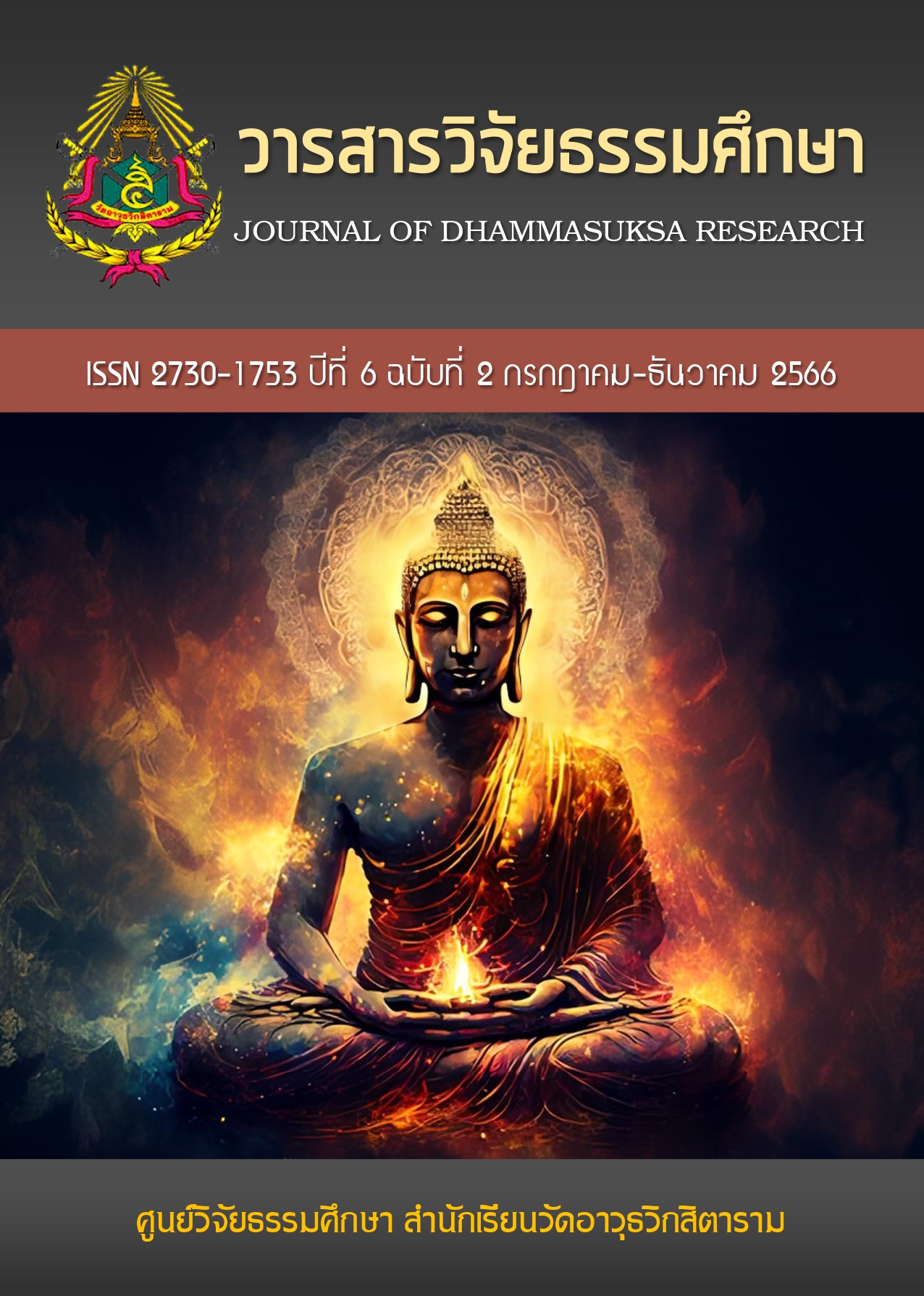Mechanism Training Management of Innovative Talents In Higher Education Under Liaoning Province
คำสำคัญ:
Innovative talent, Talent training management, Higher education under Liaoning Provinceบทคัดย่อ
The objectives of this research were: (1) to examine the composition factors of innovative talents training management in higher education under Liaoning Province; and (2) to propose the management mechanism of innovative talents training in higher education under Liaoning Province.
This research was a mixed method study. The population is administrators, professors, instructors of 20 universities under Liaoning Province. They have many years of experience in innovation education and talent cultivation management. A total of 877. Krejie and Morgan (Table 1970) obtained a total of 280 samples using stratified sampling technique. There are five key information providers, namely experts and scholars in innovation education and talent cultivation management. Obtained through purposeful sampling. The tools used for data collection include semi-structured interview form, five-level questionnaire and focus group discussion form. The research was divided into three processes: research plan preparation, research procedure and research report. Statistical data used for data analysis include frequency, percentage, average, standard deviation, and combination of exploratory factor analysis and content analysis.
The research results showed that: (1) there were four components of Mechanism training management of innovative talents in higher education under Liaoning Province which consisted of management of innovative education process, the internal management of innovative talent training, the innovative talent training mode in colleges and universities, and the improvement of students' innovative ability; and (2) There are 14 strategies for the management system of innovative talents cultivation in colleges and universities under Liaoning Province: there were four strategies for the management of innovative education process, three strategies for the internal management of innovative talents cultivation, three strategies for the innovative talents cultivation mode in colleges and universities, and four strategies for improving students' innovative ability. The research results were aimed at promoting and improving the development of innovative talent training management system in colleges and universities under Liaoning Province.
เอกสารอ้างอิง
Cao Aixia. (2018). Analysis of factors affecting the quality of higher education Science weekly. (35), 8-9 doi:10.16657/j.cnki. issn1673-9132.2018.35.224.
Chen Zhifu. (2021). Research on performance evaluation and Countermeasures of innovative talent training in higher education Employment of Chinese college students. (19): 52-57.
Feng Wei. (2015). Research on the quality view and employment view of the popularization of Higher Education -- a comment on the theory and policy of the popularization of higher education. China Science and Technology Management Research. (01: 207 Doi)
Guo Yan Feng. (2019). Research on the training mode of innovative talents in Applied Undergraduate higher education under innovative thinking Modern commerce and industry. (02): 72-73 doi:10.19311/j.cnki. 1672-3198.2019.02.036.
Hu Haishan, Xu Linmin (2017). Research on the training mechanism of innovative talents in higher education under the background of "double first class" construction Curriculum Education Research, (04): 29.
Hu Bin. (2019:121-122). Investigation and Research on the reform of innovative talent training mode in higher education in China. (Master's thesis, Jiangxi Normal University).
Hou Lixia. (2010). Research on the training mode of innovative talents in Applied Undergraduate higher education Based on the deep integration of industry and education. Journal of Jilin Normal University of Engineering and Technology,
(09): 4-6
Jili. (2011). Research on talent training model of new applied undergraduate colleges. International Journal of Information and Education Technology, (09): 652-660.
Liu Bin. (2019). The presupposition of cognitivism Henan Social Sciences, 94-99 doi:10.3969/j.issn. 1007-905X. 2019.09.017
Liu Xiaoxia. (2020). Cultivation of innovative talents in higher education from the perspective of culture Educational Research, (01): 9-13.
Li Weiming and Li Chunyan. (2015). Research on the development of innovative talents in contemporary China. doctoral dissertation, Shandong University) https://kns.cnki.net/KCMS/detail/detail.aspx?dbname=CDFD1214&filename=1012461517.nh.
Qiang Chengzhong. (2020). Theory and practice of innovation and entrepreneurship education in higher education in the new era Science Press. 2020: 3
Shi Hui. (2015). Research on the training mechanism of innovative talents in higher education under the collaborative innovation mode. Journal of Higher Education,
(01): 150-151.
Shen Junge and Zhang Guozheng. (2015). On the significance of Carlson's theory of scientific epistemology. Poyang Lake Journal, (02): 38-48 + 125 doi:10.3969/j.issn. 1674-6848.2015.02.004
Si DongMei, Zhang jing, Liu Chunyuan. (2015). Pluralism and generalization: a theoretical analysis of graduate education quality Graduate education, 6-05.
Shi Yuhuan. (2008). Comprehensive Evaluation of Talent Growth Factor Index System Based on Hesitant Fuzzy Language. Journal of Mathematics.
Wang Haijun, Zhang Ying, Liang Zhishen, Huang Yao, LingShengDong. (2019). Problems and suggestions on the teaching evaluation system of innovative talent training. China University of science and Technology, (04): 69-70 doi:10.16209/j.cnki. cust. 2019.04.021
Xiao Hongting. (2019:96-98) and Li Juan. (2019:60). Ideas and methods of quality management to win the great future. Beijing: China Standards Press,
Yidan. (2017). Research on the training mode of innovative talents in higher education from the perspective of school enterprise cooperation (eds.) proceedings of the second prize for excellent papers at the 2017. academic annual meeting of Liaoning society of Higher Education (pp.462-472)
Yu Yaojun, Li Hua. (2016). Higher education quality view based on product quality theory Educational academic monthly, (09): 50-52 doi:10.16477/j.cnki. issn1674-2311.2016.09.022)
Yuan Chuan. (2014). The problems and countermeasures of experimental teaching in innovation-oriented talents training. Research and Exploration in Laboratory, 4: 23-25.
Zong Xiaowei. (2018). Education is the intermediary of human value life -- on value and value in education Educational Research Press, (3)
Zhang Jinping, Gao Ziqing. (2015). The concept definition and elements analysis of talent training mode in higher education. University Education Science,
(03): 30-36.
Zhang Yaguang. (2015). Exploration and practice of innovative talent training mode in higher education Intelligence, (15): 60.
ดาวน์โหลด
เผยแพร่แล้ว
รูปแบบการอ้างอิง
ฉบับ
ประเภทบทความ
หมวดหมู่
สัญญาอนุญาต
ลิขสิทธิ์ (c) 2023 วารสารวิจัยธรรมศึกษา

อนุญาตภายใต้เงื่อนไข Creative Commons Attribution-NonCommercial-NoDerivatives 4.0 International License.



